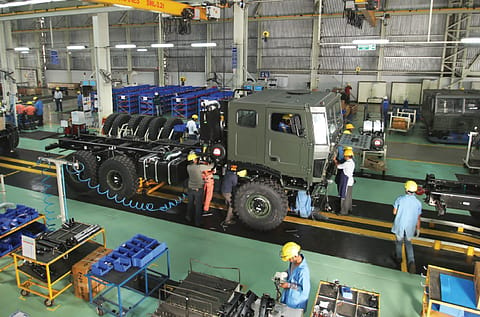Defence & aerospace industry expects sops from Budget 2023
Industry expects Budget to focus on R&D, speedy orders and creation of testing facilities to support innovation and to create an ecosystem for the defence & aero industry.

Defence and aerospace, an emerging industry in India following recent policy initiatives for increased private sector participation, expects sops in the upcoming Union Budget 2023-24 to kickstart big growth.
India's overall defence budget for 2022-23 was ₹5,25,166 crore ($70.6 billion), which included salaries (31%), pensions (23%) and about 24% allocated for weapons and equipment for modernisation. The defence capital allocation as a part of the Union Budget for the current financial year had witnessed an increase of about 13% over the previous year. Also, the allocation for indigenous acquisition has been increased from 58% to 68% of the capital budget and 25% of the allocation was reserved for the private sector.
"This year we are hoping that we see an increase of 10-15%, i.e, around ₹45-47 lakh crores,” says Pavan G Ranga, Chairman, Rangsons & Director, NR Group.
The government has put in place the necessary policy support for increasing private sector participation in the defence & aero industry. Some of these measures include relaxation of licensing norms and bringing level playing field by introducing policy on exchange rate variation, positive indigenisation lists, creation of a separate head under defence budget for domestic procurement and various exemptions being provided for setting up facilities in new defence corridors. However, the industry believes more needs to be done, especially in research and development, speedy orders and creation of testing facilities to support innovation and to create an ecosystem for these segments.
"The key to building a thriving ecosystem would be to put the built capabilities and capacities to utilisation by placing orders," says SP Shukla, Chairman, Mahindra Defence & Mahindra Aerospace. It is important to note that when order for large platforms are placed, the OEM of the platform places order on its vendors which are mostly MSMEs and this is the best way to create and nurture the ecosystem of Defence & Aero companies in India, says Shukla, also President of the Society of Indian Defence Manufacturers (SIDM).
"Own Intellectual Property (IP) alone grants us freedom to export, besides becoming self-reliant. Towards this, while we see a good traction in Make-II (Industry funded projects) in the recent years, the Make-I (joint funding by Ministry of Defence (MoD) and Industry) is yet to take off for fear of funding R&D in private sector, as R&D being inherently fraught with uncertainty of results,” says J D Patil, Whole-time Director and Senior Executive Vice President for Larsen & Toubro (L&T)’s Defence Business.
He also notes that Make-I programmes can help India build platform capability and thus grant ability for unhindered large ticket exports. However, this is yet to see traction in spite of MoD’s assertions after FY21-22 budget to initiate at least five Make programmes during the year and every year thereafter.
The Union Budget 2021-22 had earmarked 65% of the capital expense for defence sector to be focussed on Atma Nirbhar Bharat implementation programme for acquisition through Indian entities. The industry expects a similar or more allocation for the next fiscal year.
Recommended Stories
Another demand is to allocate funds in the budget to acquire defence technology companies outside of India by creating a public-private sector platform for acquiring new technologies from the U.S. and Europe. "There are a number of smaller defence technology companies outside India that are available for acquisition", says Ranga.
Along with the budget, what is important is that the budget allocated has to be utilised completely, in the year. Industry specialists note that the Army only utilises about 50% of the budget year-on-year because of inherent challenges of speed of acquisition among other things.
Another demand is to increase spending on research and development. Last year the budget for overall R&D was less than 1% of the budget. "Funds for Innovation in Defence Excellence (IDEX) should be significantly increased to about ₹500 to ₹600 crore to foster public partnership programmes between industry, startup and academia," says Ranga.